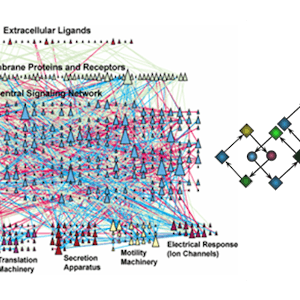Introduction to Systems Biology
This course will introduce the student to contemporary Systems Biology focused on mammalian cells, their constituents and their functions. Biology is moving from molecular to modular. As our knowledge of our genome and gene expression deepens and we develop lists of molecules (proteins, lipids, ions) involved in cellular processes, we need to understand how these molecules interact with each other to form modules that act as discrete functional systems. These systems underlie core subcellular processes such as signal transduction, transcription, motility and electrical excitability. In turn these processes come together to exhibit cellular behaviors such as secretion, proliferation and action potentials. What are the properties of such subcellular and cellular systems? What are the mechanisms by which emergent behaviors of systems arise? What types of experiments inform systems-level thinking? Why do we need computation and simulations to understand these systems?The course will develop multiple lines of reasoning to answer the questions listed above. Two major reasoning threads are: the design, execution and interpretation of multivariable experiments that produce large data sets; quantitative reasoning, models and simulations. Examples will be discussed to demonstrate “how” cell- level functions arise and “why” mechanistic knowledge allows us to predict cellular behaviors leading to disease states and drug responses.
None
Syllabus
Syllabus - What you will learn from this course
Week 1
Systems Level Reasoning | Molecules to Pathways
Week 2
Pathways to Networks | Physical Forces and Electrical Activity in Cell Biology
Week 3
Mathematical Representations of Cell Biological Systems | Simulations of Cell Biological Systems
Week 4
Experimental Technologies | Network Building and Analysis
Week 5
Midterm
Week 6
Analysis of Networks | Topology to Function
Week 7
Strengths and Limitations of Different Types of Models | Identifying Emergent Properties
Week 8
Emergent Properties: Ultrasensitivity and Robustness | Case Studies
Week 9
Case Studies | Systems Biomedicine | Systems Pharmacology and Therapeutics | Perspective
Week 10
Final
FAQ
When will I have access to the lectures and assignments?
Access to lectures and assignments depends on your type of enrollment. If you take a course in audit mode, you will be able to see most course materials for free. To access graded assignments and to earn a Certificate, you will need to purchase the Certificate experience, during or after your audit. If you don't see the audit option:
What will I get if I subscribe to this Specialization?
When you enroll in the course, you get access to all of the courses in the Specialization, and you earn a certificate when you complete the work. Your electronic Certificate will be added to your Accomplishments page - from there, you can print your Certificate or add it to your LinkedIn profile. If you only want to read and view the course content, you can audit the course for free.
Is financial aid available?
Yes. In select learning programs, you can apply for financial aid or a scholarship if you can’t afford the enrollment fee. If fin aid or scholarship is available for your learning program selection, you’ll find a link to apply on the description page.
Reviews
Coursera make it different...
I'm pretty lucky to find a systems biology course like this.
Great course! The only change i would ask for: after the test, could you let us see the correct response to the questions we got wrong? Thanks!
A fantastic introductory course. One should really treat this as an overview that needs to be followed by further study.
It's a challenging subject. Don't expect to walk away from the course with a complete grasp of systems biology. However, this course is a fantastic place to start.
